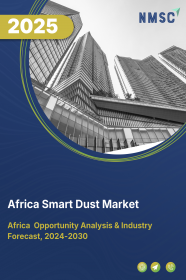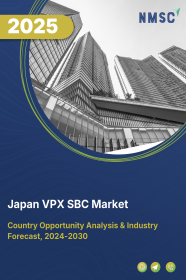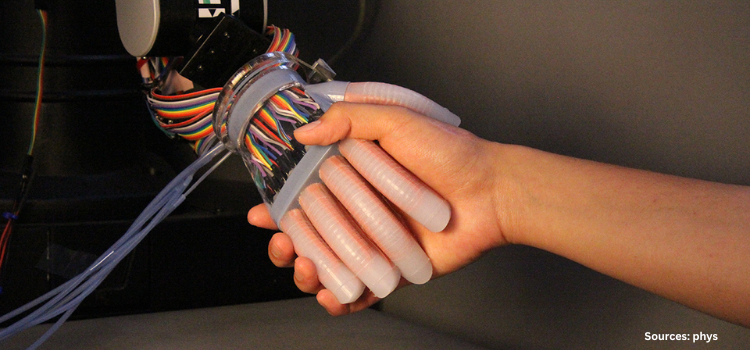
Africa Smart Dust Market by Component (Sensors, Active Optical Transmission, Passive Optical Transmission, Optical Receiver, Analog I/O, Signal Processing, Control Circuitry, Power Source, and Others), by Manufacturing Process (3D Printing and Microfabrication), by Type (Biodegradable and Non-Biodegradable) and Others – Opportunity Analysis and Industry Forecast 2026-2030
Industry: Semiconductor & Electronics | Publish Date: 14-Feb-2025 | No of Pages: 127 | No. of Tables: 93 | No. of Figures: 58 | Format: PDF | Report Code : SE1935
Market Definition
The Africa Smart Dust Market will value at USD 137.51 thousand in 2025 and is predicted to reach USD 592.71 thousand by 2030, at a CAGR of 27.9% from 2026 to 2030. Present-day advanced technologies prioritize miniaturization and automation. The evolution of computing has been characterized by enhanced connectivity, diminishing size of computing devices, and amplified communication with the world. The surging popularity of smaller computing devices such as mobile phones and handheld computers, coupled with the advancement of micro sensors and micro transistors, has significantly hastened the development of further nano computing devices.
Consequently, heightened interaction with the environment and the emergence of small computing elements offers enriched opportunities to reshape interactions among computers, humans, and the environment. These aspects have spurred the creation of Smart Dust, a compilation of numerous microelectromechanical systems (MEMS) including sensors and other devices capable of detecting light, temperature, magnetism, vibration, or chemicals, among other variables. Typical Smart Dust comprises nano-structured silicon sensors that can independently orient, sense, assemble, and report on the environment in which they are situated.
Integration of Smart Dust in the Medical Sector is Expected to Drive the Africa Market in the Coming Years
The integration of smart dust in the medical sector is poised to revolutionize healthcare practices in the country in the years ahead. With its miniature size and wireless connectivity, smart dust sensors can be deployed within the human body to monitor various vital signs, detect early signs of disease, and even deliver targeted treatments. This technology enables real-time data collection, leading to more accurate diagnoses and personalized medical interventions. Additionally, the continuous monitoring facilitated by smart dust enhances preventive care and allows for timely interventions, ultimately improving patient outcomes and reducing healthcare costs. As a result, the adoption of smart dust in the medical sector is anticipated to drive significant growth in the smart dust market as healthcare providers increasingly recognize its potential to transform the delivery of healthcare services.
Industrial Monitoring Capabilities of Smart Dust is Expected to Increase its Adoption in Africa
The industrial monitoring capabilities of smart dust in the country are anticipated to propel its adoption to new heights. With its ability to provide real-time data on various aspects of industrial operations, such as equipment performance, environmental conditions, and safety parameters, smart dust offers unparalleled insights for optimizing efficiency and productivity. By enabling continuous monitoring and predictive maintenance, smart dust helps businesses minimize downtime, reduce operational costs, and enhance overall performance. As industries worldwide strive for greater automation, efficiency, and sustainability, the demand for smart dust solutions is expected to skyrocket, driving widespread adoption across diverse sectors from manufacturing and energy to transportation and logistics. This increased adoption is poised to revolutionize industrial processes and pave the way for a smarter, more connected future.
Privacy Concerns Associated with Smart Dust Hinders the Africa Market Growth
Privacy concerns linked with smart dust pose a significant obstacle to market growth in the country. While the technology offers unprecedented capabilities for data collection and analysis, the constant monitoring it enables raises apprehensions about individual privacy and data security. Users worry about the potential for unauthorized access to sensitive information collected by smart dust sensors, as well as the possibility of covert surveillance.
These concerns are further compounded by the sheer ubiquity of smart dust deployment, raising questions about consent and control over personal data. As a result, individuals, businesses, and regulatory bodies are hesitant to fully embrace smart dust technology, slowing its market expansion as stakeholders seek robust solutions to address these privacy challenges.
Introduction of Smart Dust in Space Research is Expected to Create Ample Opportunities in the Africa Market
The introduction of smart dust in space research is poised to unlock abundant opportunities in the market in the country. By leveraging its miniature size, wireless connectivity, and advanced sensing capabilities, smart dust enables unprecedented data collection and analysis in space exploration missions. These tiny sensors can be deployed across vast cosmic environments to gather valuable insights on celestial bodies, atmospheric conditions, and spacecraft performance.
Additionally, smart dust technology facilitates real-time monitoring and adaptive decision-making, enhancing the efficiency and success of space missions. As space agencies and private enterprises increasingly rely on data-driven approaches to explore the cosmos, the demand for smart dust solutions is expected to surge, driving market growth and innovation in the space research sector.
Competitive Landscape
Various market players operating in the Africa smart dust market include HP, Cisco Systems Inc, Analog Devices, Lightricity Ltd, IBM, CubeWorks, SINTEF, Sonardyne International Ltd, General Electric, and Hitachi.
Africa Smart Dust Market Key Segments
By Component
-
Sensors
-
Active Optical Transmission
-
Passive Optical Transmission
-
Optical Receiver
-
Analog I/O
-
Signal Processing
-
Control Circuitry
-
Power Source
-
Others
By Manufacturing Process
-
3D Printing
-
Microfabrication
By Type
-
Biodegradable
-
Non-Biodegradable
By Applications
-
Humidity Monitoring
-
Temperature Monitoring
-
Surveillance
-
Pressure & Stress Monitoring
-
Sound Monitoring
-
Others
By End User
-
Aerospace & Defense
-
Pharmaceutical & Lifesciences
-
Agriculture
-
Industrial
-
Government
-
Construction
-
Transportation & Logistics
-
Telecommunication
-
Others
REPORT SCOPE AND SEGMENTATION:
|
Parameters |
Details |
|
Market Size in 2025 |
USD 137.51 Thousand |
|
Revenue Forecast in 2030 |
USD 592.71 Thousand |
|
Growth Rate |
CAGR of 27.9% from 2026 to 2030 |
|
Analysis Period |
2025–2030 |
|
Base Year Considered |
2025 |
|
Forecast Period |
2026–2030 |
|
Market Size Estimation |
Thousand (USD) |
|
Growth Factors |
|
|
Companies Profiled |
10 |
|
Customization Scope |
Free customization (equivalent up to 80 analysts working hours) after purchase. Addition or alteration to country, regional & segment scope. |
|
Pricing and Purchase Options |
Avail customized purchase options to meet your exact research needs. |
KEY PLAYERS
-
HP
-
Cisco Systems Inc.
-
Analog Devices
-
Lightricity Ltd.
-
IBM
-
CubeWorks
-
SINTEF
-
Sonardyne International Ltd.
-
General Electric
-
Hitachi

















 Speak to Our Analyst
Speak to Our Analyst





















